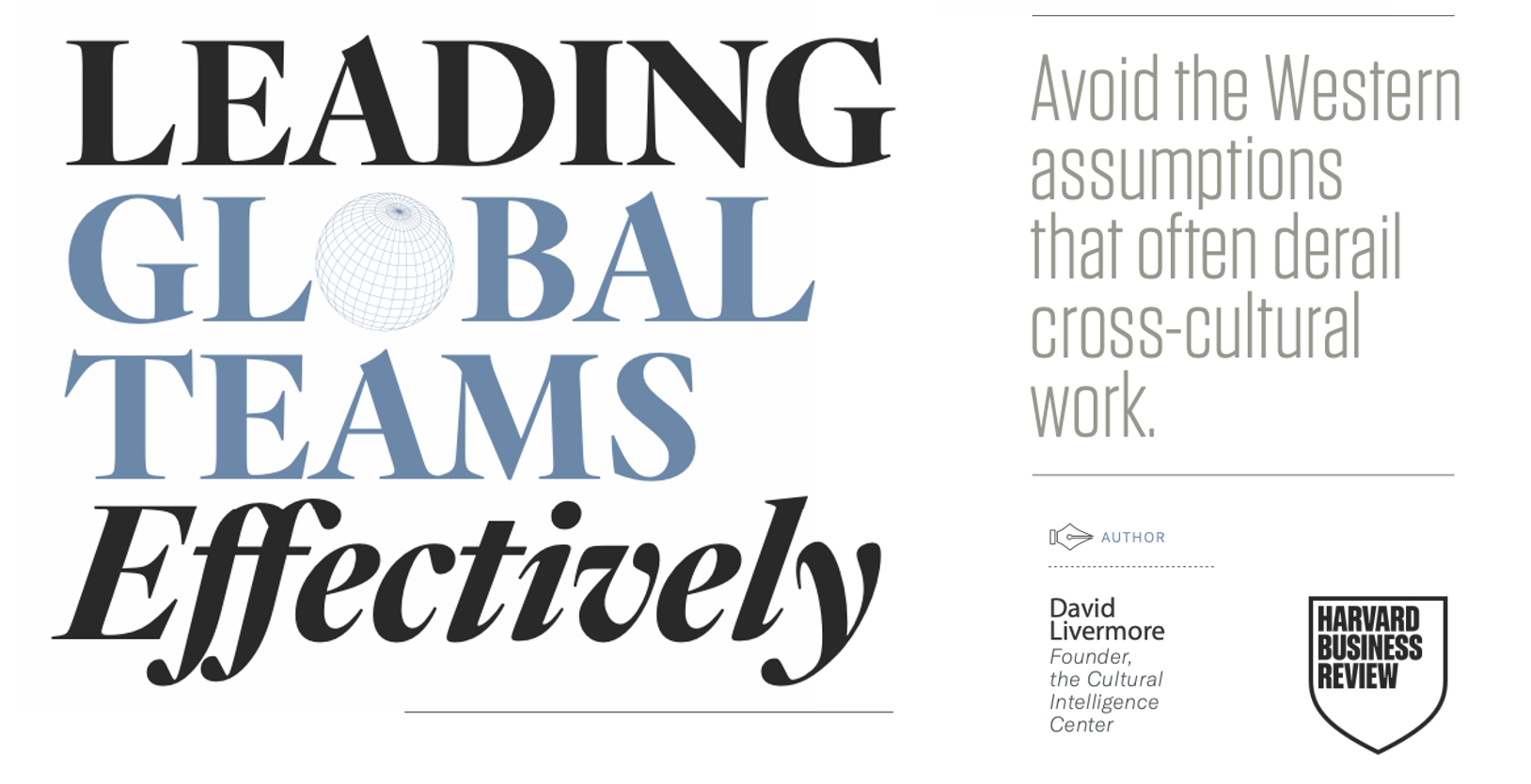
In preparation for our CQ Fellows Retreat next month, I’ve been revisiting hundreds of peer reviewed articles from more than 20 years of research on cultural intelligence. CQ research has been conducted across more than 150 countries and published in more than 600 academic journals spanning many disciplines. At the core of the cultural intelligence research is the four CQ capabilities that predict effectiveness in culturally diverse contexts along with several outcomes that result from high CQ. But alongside those seminal findings are some other fascinating insights with profound relevance for how we lead in today’s digital, diverse world.
Here are a few of the CQ findings I’ve been thinking about:
1. CQ reduces anxiety
While we rightfully talk about the benefits of diversity, the truth is, being with people who are different from us makes us anxious. This has been proved in hundreds of studies for many decades. We’re predisposed to feeling more comfortable around people who look like us and share our values. Fortunately, one of the most consistent outcomes of cultural intelligence is what we call cross-cultural adjustment, which basically means our ability to manage the internal dissonance, irritation, and exhaustion that comes from being in diverse settings. This has powerful implications for all of us but especially for marginalized groups. Building CQ has direct links to well-being. Given our current mental health crisis combined with the backlash against many diversity efforts, this is really good news.
2. Knowing a lot about culture/s can be dangerous
Since the very beginning, the research on cultural intelligence has demonstrated that knowledge is only one of the four skills needed to be effective in culturally diverse situations. We also need to develop motivation (CQ Drive), meta-cognition (CQ Strategy) and behavioral flexibility (CQ Action). But a meta-analysis of hundreds of studies published in 2018 found that not only is cultural knowledge insufficient, by itself, it can actually be dangerous. It may actually be better to hire someone who is low in all four CQ capabilities than to hire someone who has a lot of knowledge but no openness and curiosity about people with different backgrounds (CQ Drive). Knowledge about systemic racism, the history of different nations, and understanding cultural values is important but by itself, this knowledge can make us over-confident and unable to do the hard work of adapting. Don’t teach people about culture and bias unless you build their motivation, cognitive flexibility, and adaptability.
3. CQ promotes psychological safety
Many organizations promote psychological safety without fully understanding what it means. Amy Edmondson’s groundbreaking research shows that when people feel safe to be themselves, share their ideas, and take risks, everyone wins. But an uninformed approach to psychological safety can come at the expense of intellectual honesty—the use of debate and dialogue to push one another to learn through different viewpoints. The challenge is to create teams that are safe enough where robust debate can occur without the fear of retribution, mansplaining, or everyone agreeing just to avoid conflict. When leaders and their teams have high CQ, they’re more likely to seek out diverse perspectives and leverage the power of psychological safety to support inclusion and performance.
4. CQ doesn’t improve in a straight line
Sometimes people are troubled by the fact that their CQ scores haven’t improved as much as they thought they would or worse yet, have gotten worse. There are many variables that influence our current proficiency in each of the four CQ capabilities. If we’re physically exhausted or going through an immense period of stress, it’s not surprising that our CQ Drive scores may move backwards for a while. If we’re suddenly immersed in a cultural context that is unlike anything we’ve ever experienced before, that can have a negative effect on our CQ. One study assessed the CQ of Chinese exchange students at four times between their departure from China and 3 months into their studies at a US university. The results revealed some intriguing patterns with students consistently scoring high in CQ before they left home, declining CQ scores during the first two months in the US, and a rebound for most students in the third month.
5. CQ can improve “at home” as much as abroad
International travel is one of the best ways to improve cultural intelligence. But it’s not automatic. If not done well, these experiences can actually perpetuate ethnocentrism and stereotypes. Travel that builds CQ includes direct interaction with locals, space for reflection, and life away from the places and business catering to tourists. The research on CQ has been telling us this for a long time. But here’s a really interesting finding! There is no significant difference in student improvements in cultural intelligence between study abroad programs conducted overseas versus those in domestic locations. A student can develop cultural intelligence as much from immersing themselves in an unfamiliar region of their own country as from spending that time overseas. Most of us don’t even need to leave our hometowns to get some of this effect. Roaming the aisles of a supermarket targeting a different ethnic demographic group and observing the foods for sale, the marketing approaches, the approach to customer service, and the layout of the store are ripe for building our CQ. Sitting in on a different department’s weekly meeting to hear the things they talk about, the inside jokes, and the jargon can build CQ. And attending a political rally that does not align with our own preferences may do more to build our CQ than a ten day trip abroad might. Direct experience at home or far away is consistently linked to improving CQ, as long as it’s combined with reflection and perspective-taking.
6. CQ predicts inclusive leadership more strongly than EQ does
Cultural intelligence and emotional intelligence emerge from the same theoretical framework, which says intelligence is not confined to a single source in the brain; it’s found in various areas of our cognitive functioning. EQ is a stronger predictor of leadership effectiveness in monocultural settings because it predicts likability and trustworthiness among people from similar backgrounds. However, CQ is a stronger predicter of leadership effectiveness in diverse situations because it gives us the capability to adjust how to garner trust and likability when there are diverse cultural values and identities present. Many studies have looked at the relationship between EQ and CQ throughout the years but a meta-study of more than 18,000 individuals that was recently published found once again that CQ was a better predictor of effectiveness in culturally diverse settings. It’s not that EQ is irrelevant for inclusive leadership. It’s that the benefits of EQ are amplified when you develop CQ as well.
These kinds of findings can guide how we help students, employees, and executives develop and apply cultural intelligence. It’s a joy to work with a growing community of academic colleagues across the world who are expanding the research on CQ, together with our amazing group of CQ Fellows and other practitioners who are committed to translating this research into practical solutions that will build a more culturally intelligent world for all of us.



